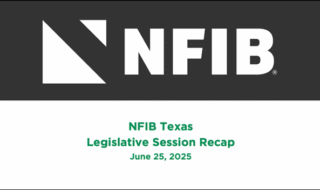May 5, 2022
Jobs Crisis Continues as Share of Owners Who Report Unfilled Positions Remains High
NFIB’s monthly Jobs report found that in April owners continued to raise wages to keep employees and fill historically high levels of open positions. Reports of labor costs as the top business problem are at 48-year record high levels, just five points below the record set in December 2021. Eight percent of owners cite labor costs as their top business problem, unchanged from March. Meanwhile, 23% name labor quality as their top business problem, up 1 point from March. This makes labor quality the second-most challenging issue facing owners, with inflation remaining in first.
“The labor force participation rate is slowly rising, which is good news for small businesses looking for workers,” said Bill Dunkelberg, NFIB Chief Economist. “While wage gains have been good, inflation has outpaced it, reducing real disposable income. Small employers continue to raise wages and make business adjustments to attract qualified employees.”
A major challenge for small businesses since last year is the ongoing labor shortage. Small business owners reporting job openings they could not fill remains at 47%, unchanged from March. This is more than double the 48-year historical average of 23%.
The report showed that 40% of owners have open positions for skilled workers (up one point from March) while 22% have openings for unskilled workers (down one point from March). The construction industry is particularly hard-hit, with 64% of construction firms reporting few or no qualified applicants for their positions, a two-point increase from March.
Fifty-nine percent of owners report hiring or trying to hire in April, a one-point decrease from March. Of those owners, 93% reported few or no qualified applicants for the positions they were trying to fill – a stat unchanged from March. Also unchanged is the elevated number of owners (a net 20%) who plan to create new jobs in the next three months.
A net 46% of owners report raising employee compensation, a three-point decrease from March. Another 27% report that they intend to raise compensation in the next three months, a one-point decrease. As labor costs rise, so do prices, passing the cost of compensation increases onto consumers.
You can read the full monthly Jobs report here, and read a press release summarizing its findings here.
In a recent editorial for Forbes, Dunkelberg argued that the small business economy shows all signs of a recession, even as Washington and the Federal Reserve deny it. “The Administration sees no recession, the Fed seems to be on board as well with scheduled rate hikes still in place,” Dunkelberg wrote. “But small business doesn’t agree, and they are the ones in the trenches every day making up nearly half of the private economy.”
At a time when small businesses face such serious obstacles, Congress has proposed adding higher taxes and new mandates that would impact small businesses. To let your Members of Congress know why your business can’t afford harmful tax increases or mandates, click here to customize and send your message.?
NFIB is a member-driven organization advocating on behalf of small and independent businesses nationwide.
Related Articles














